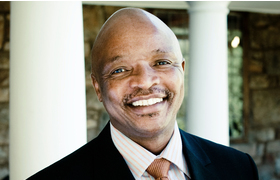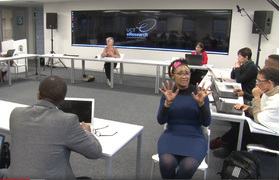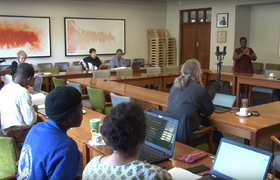UCT Philosophy Department statement on the Rocking the Daisies concession
20 October 2017The views and opinions expressed here are solely those of the individual authors in their private capacity; they do not represent or reflect the views, opinions or policies of the University of Cape Town or the Communication and Marketing Department.
Towards the end of September 2017, a screenshot of a Vula announcement by the convenor of Ethics (PHI1010S), Dr Tom Angier, began circulating on social media. The announcement was intended to inform students that if they had booked tickets to the Rocking the Daisies music festival before the dates of class tests for the course had been announced, then they could request to be excused from the second class test on Friday 6 October. If the concession was granted, their remaining coursework was to be reweighted—an advantage only on the assumption that writing a second test would not have raised their coursework average—and they were to be permitted to write the final exam.
Much of the social-media commentary and reporting in the news media which ensued propagated the idea that since more white people than black people usually attend Rocking the Daises, this Vula announcement was an example of structural racism or the privileging of white students at the University of Cape Town (UCT). On Monday 2 October, the UCT Black Academic Caucus (BAC) released a statement declaring that the convenor’s announcement forced black students to “watch as racialised privilege is paraded before them”.
At UCT, decision-making on concessions such as granting deadline extensions or excusing students from assessments is generally devolved to course convenors. It is then for each convenor to respond fairly, consistently and compassionately to requests for concessions, having due regard for students’ medical conditions, participation in sporting events, other academic and professional obligations, religious and family commitments, and any further events in students’ lives which constitute good cause for a concession. Devolution of decision-making on concessions makes good sense, because courses differ in dimensions such as size, nature of teaching and style of assessment; what is good policy for one course is not necessarily good policy for another. For example, missing a class test may be more of a problem in a course with one test than in a course with two. But it is also true that sometimes two different lecturers would come to different decisions about one and the same request for a concession. Often this is not because one of them is blinkered or in the grips of prejudice, but because this is a domain where there are grey areas and hard cases, about which reasonable people can disagree.
Having looked into the Rocking the Daisies concessions originally granted for PHI1010S, and also the other concessions granted for this course, we as a department are satisfied that the convenor granted concessions consistently and non-prejudicially, compassionately applying a reasonable interpretation of good cause.
Students who booked tickets to this music festival before the dates of the class tests were announced firstly regarded the festival as an important enough event in their lives to merit making a booking well in advance, and secondly assumed at the time of making a booking that they would miss just one lecture (not a compulsory test) by attending the festival. Dr Angier took the view that in these circumstances it was fair to excuse them from the test, much as one might justifiably excuse a student from the test who had booked a long-distance trip well in advance so as to be at a cousin’s wedding. Some might baulk at this comparison, dismissing Rocking the Daisies as a mere “entertainment event”. Others might wish their course convenors had been strict enough to give them a reason not to attend a string of tedious weddings in the family. Yet others might reflect that they have had experiences of a far more numinous quality at music festivals than at the religious ceremonies for which they are routinely granted concessions by UCT convenors. Clearly this is an area where people’s different value emphases and life priorities are likely to yield different judgements. In such cases it is often best to resist the urge to impose one’s own personal values and priorities on others.
Consequently, we regard Dr Angier’s decision to be lenient in his response to Rocking the Daisies concession requests as reasonable, even if not everyone would have taken the same decisions.
Moreover, we are of the opinion that he should have been allowed to grant the concessions he planned to grant. However, we note that following a decision by Senate Executive Committee on 2 October, the Acting Dean of Humanities, on Wednesday 4 October, issued an instruction to convenors in the faculty not to grant concessions for Rocking the Daisies. All of us have complied with this new directive from the Humanities Faculty.
When he received the concession requests which prompted him to post his Vula announcement, Dr Angier had no inkling of the racial demographics of Rocking the Daisies attendees, and rightly did not think he needed to acquaint himself with these before taking a decision about the requests. As a matter of fact, it is not true that only white UCT students attend—or seek concessions for
attending—Rocking the Daisies, as has been implied; it is certainly not the case that only white students took up the invitation to apply for a concession in PHI1010S. Those who have portrayed “Daisies-gate” as a case of racism or privileging of whites have mutilated the facts to fit a predetermined narrative. A former Student Representative Council (SRC) president, whose tweet
asking “why white students are moving test dates to get drunk at Rocking the Daisies” featured in Varsity’s reporting on “Daisies-gate”, was, this time last year, posting photos on social media of himself attending Rocking the Daisies—though he would not count himself as “white”. This is one example of the mala fides of many who have contributed to forcing a racism interpretation upon
“Daisies-gate”.
In PHI1010S this semester, students have been granted concessions because of ill health, personal loss, religious holidays and other commitments such as attending the Black August Cultural and Intellectual Festival in Tshwane. It is not true that the convenor would have refused to excuse students from the test because of a religious holiday or a personal loss, as has been alleged. Pointing to cases in which students from other courses were not granted a concession to attend the Open Book Festival, or in which the UCT Examinations Office did not move an exam which clashed with a religious holiday, does not establish unfairness or wrongful inconsistency on the part of the Philosophy Department or the convenor of PHI1010S. There are often good reasons why a concession appropriate for one course will not be appropriate for another, and neither departments nor convenors are responsible for the university examinations timetable.
What is true is that only students who come forward and ask for a concession in a course have a chance of being granted one. This can undoubtedly create a situation in which some students with legitimate grounds for concessions do not receive concessions, while students who, for whatever reason, are more confident in coming forward and petitioning the lecturer do receive concessions. Dr Angier intended to avert precisely such an outcome by posting an announcement which would be read by students unsure of whether they could request a concession on these non-routine grounds.
The Vula announcement he posted was the trigger of the “Daisies-gate” moral panic. The Philosophy Department acknowledges the values of equality, inclusion, justice (including epistemic justice) and non-discrimination as important, and worthy of serious attention and discussion. This is reflected in individual department-members’ teaching and published research, in the courses we offer to undergraduate and postgraduate students, and in the conferences, workshops and seminar series department-members have convened or participated in. When an influential body such as the BAC propagates factually inaccurate statements and malicious insinuations about our department in the name of these values, it not only defames us but defaces the moral currency. We are concerned that some students may already be choosing not to take philosophy courses at UCT due to the distorted picture of the department which is being pushed opportunistically by some into the mainstream.
Finally, we are outraged by the vandalisation of the Philosophy Department which occurred during the night of 3-4 October. This occurred shortly after the following Facebook status appeared on the profile of a UCT SRC-member and prominent cadre of the Pan-Africanist Student Movement of Azania: “It’s on comrades. Black students in philosophy will be closing down the department. As an academic Rep of the current SRC the philosophy department has been at forefront of blunted racism. So let it fall and it must fall with UCT.” Accompanying the Facebook status was a photograph of a poster referencing the Rocking the Daisies controversy, tens of copies of which were found pasted onto the walls of the vandalised reception and atrium areas on the morning of 4 October. We urge the University to investigate thoroughly this case of vandalism. It ought not to be that individuals incite and commit such acts with impunity, even when they sit on high committees of the University.
 This work is licensed under a Creative Commons Attribution-NoDerivatives 4.0 International License.
This work is licensed under a Creative Commons Attribution-NoDerivatives 4.0 International License.
Please view the republishing articles page for more information.









